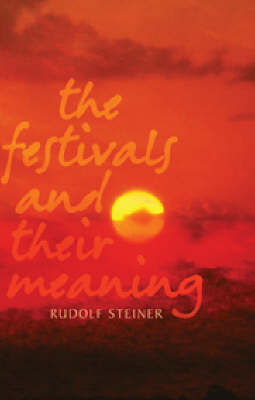
The Festivals and Their Meaning
Rudolf Steiner Press (Verlag)
978-1-85584-045-4 (ISBN)
The Festivals and Their Meaning collects thirty of Rudolf Steiner's most important lectures on the festivals of the year. He identifies and illumines the true meaning behind Christmas, Easter, Ascension, Pentecost, and Michaelmas, emphasizing their inner spiritual and outer cosmic aspects.
Steiner shows that the festivals do not only commemorate great historical events and truths of the Christian tradition; they are in themselves--each year--spiritual events that manifest in seasonal and natural rhythms and carry a significance that grows and deepens with the development of human evolution.
CONTENTS
Christmas
Introduction by Ann Druitt
The Christmas Festival: Heralding the Victory of the Sun
Signs and Symbols of the Christmas Festival
The Birth of the Sun-spirit as the Spirit of the Earth: The Thirteen Holy Nights
Christmas as a time of Grievous Destiny
The Proclamations to the Magi and the Shepherds
On the Three Magi
The Revelation of the Cosmic Christ
The Birth of Christ within Us
Easter
Easter: The Festival of Warning
The Blood Relationship and the Christ Relationship
The Death of a God and Its Fruits in Humanity
Spirit Triumphant
The Teachings of the Risen Christ
Easter: The Mystery of the Future
Spiritual Bells of Easter, parts 1 & 2
Ascension and Pentecost
The Whitsun Mystery and Its Connection with the Ascension
Whitsun: The Festival of the Free Individuality
World Pentecost: The Message of Anthroposophy
Whitsun: A Symbol of the Immortality of the Ego
The Whitsuntide Festival: Its Place in the Study of Karma
Whitsun Verse
Michaelmas
Michael Meditation
The Michael Inspiration: Spiritual Milestones in the Course of the Year
A Michael Lecture
The Michael Impulse and the Mystery of Golgotha, parts 1 & 2
Michael and the Dragon
The Creation of a Michael Festival out of the Spirit
The Michael Path to Christ
Rudolf Steiner (1861-1925) was born in the small village of Kraljevec, Austro-Hungarian Empire (now in Croatia), where he grew up (see right). As a young man, he lived in Weimar and Berlin, where he became a well-published scientific, literary, and philosophical scholar, known especially for his work with Goethe's scientific writings. At the beginning of the twentieth century, he began to develop his early philosophical principles into an approach to systematic research into psychological and spiritual phenomena. Formally beginning his spiritual teaching career under the auspices of the Theosophical Society, Steiner came to use the term Anthroposophy (and spiritual science) for his philosophy, spiritual research, and findings. The influence of Steiner's multifaceted genius has led to innovative and holistic approaches in medicine, various therapies, philosophy, religious renewal, Waldorf education, education for special needs, threefold economics, biodynamic agriculture, Goethean science, architecture, and the arts of drama, speech, and eurythmy. In 1924, Rudolf Steiner founded the General Anthroposophical Society, which today has branches throughout the world. He died in Dornach, Switzerland. Ann Druitt divides her time between teaching and writing. Matthew Barton is a translator, editor, teacher, and poet, and taught kindergarten for many years at the Bristol Waldorf School. His first collection of poems was Learning To Row (1999). He has won numerous prizes for his work, including an Arts Council Writer's Award and a Hawthornden Fellowship.
| Erscheint lt. Verlag | 15.3.2002 |
|---|---|
| Übersetzer | Matthew Barton |
| Zusatzinfo | Illustrations |
| Verlagsort | East Sussex |
| Sprache | englisch |
| Themenwelt | Religion / Theologie ► Christentum ► Kirchengeschichte |
| Religion / Theologie ► Christentum ► Liturgik / Homiletik | |
| Geisteswissenschaften ► Religion / Theologie ► Weitere Religionen | |
| ISBN-10 | 1-85584-045-6 / 1855840456 |
| ISBN-13 | 978-1-85584-045-4 / 9781855840454 |
| Zustand | Neuware |
| Haben Sie eine Frage zum Produkt? |
aus dem Bereich


